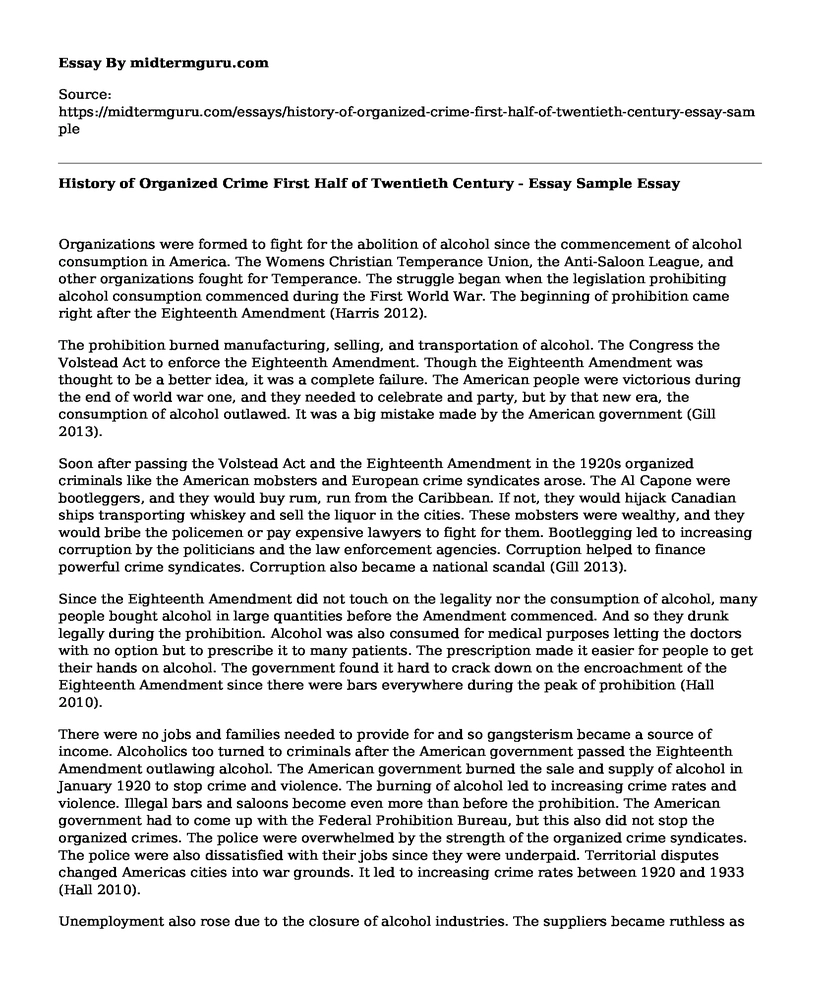Organizations were formed to fight for the abolition of alcohol since the commencement of alcohol consumption in America. The Womens Christian Temperance Union, the Anti-Saloon League, and other organizations fought for Temperance. The struggle began when the legislation prohibiting alcohol consumption commenced during the First World War. The beginning of prohibition came right after the Eighteenth Amendment (Harris 2012).
The prohibition burned manufacturing, selling, and transportation of alcohol. The Congress the Volstead Act to enforce the Eighteenth Amendment. Though the Eighteenth Amendment was thought to be a better idea, it was a complete failure. The American people were victorious during the end of world war one, and they needed to celebrate and party, but by that new era, the consumption of alcohol outlawed. It was a big mistake made by the American government (Gill 2013).
Soon after passing the Volstead Act and the Eighteenth Amendment in the 1920s organized criminals like the American mobsters and European crime syndicates arose. The Al Capone were bootleggers, and they would buy rum, run from the Caribbean. If not, they would hijack Canadian ships transporting whiskey and sell the liquor in the cities. These mobsters were wealthy, and they would bribe the policemen or pay expensive lawyers to fight for them. Bootlegging led to increasing corruption by the politicians and the law enforcement agencies. Corruption helped to finance powerful crime syndicates. Corruption also became a national scandal (Gill 2013).
Since the Eighteenth Amendment did not touch on the legality nor the consumption of alcohol, many people bought alcohol in large quantities before the Amendment commenced. And so they drunk legally during the prohibition. Alcohol was also consumed for medical purposes letting the doctors with no option but to prescribe it to many patients. The prescription made it easier for people to get their hands on alcohol. The government found it hard to crack down on the encroachment of the Eighteenth Amendment since there were bars everywhere during the peak of prohibition (Hall 2010).
There were no jobs and families needed to provide for and so gangsterism became a source of income. Alcoholics too turned to criminals after the American government passed the Eighteenth Amendment outlawing alcohol. The American government burned the sale and supply of alcohol in January 1920 to stop crime and violence. The burning of alcohol led to increasing crime rates and violence. Illegal bars and saloons become even more than before the prohibition. The American government had to come up with the Federal Prohibition Bureau, but this also did not stop the organized crimes. The police were overwhelmed by the strength of the organized crime syndicates. The police were also dissatisfied with their jobs since they were underpaid. Territorial disputes changed Americas cities into war grounds. It led to increasing crime rates between 1920 and 1933 (Hall 2010).
Unemployment also rose due to the closure of alcohol industries. The suppliers became ruthless as they fought amongst themselves for the control of alcohol trade. Bootleggers manufactured their products aimlessly. Their products were toxic. Many people became paralyzed and even died from alcohol poisoning. The government had to abolish the Volstead act after thirteen years since it had failed to control the problem and thus crime rates decreased. The primary cause of the increase in crime rates in America was the enacting of the prohibition act and made the organized crime syndicates wealthy and powerful (Gill 2013).
The response of the government to the organized crime syndicates was not smart. It did not handle the violations of the Volstead Act. Immediately after the passing of the Volstead Act, there was looting and raids all over the nation. Most of the police cases were involved with violent criminals. Many people were reported to have been killed by the policemen by the end of the 1920s due to prohibition. The police officers stopped killing the criminal, and as a result, violence increased. The unstoppable bootlegging operators bribed the policemen and the city mayors. This rate of bribery was alarming, and nobody in the government earned trust (Harris 2012).
The Democratic Party signed the repeal of prohibition in 1932. The majority of the retiring Congress suggested a repeal amendment since the Democratic Party emerged to be victorious during the previous year. During the date of repeal, the U.S Supreme court had to dismiss prosecutions since the Volstead Act had become null. Franklin Roosevelt administration proposed to adjust the Volstead Act definition of intoxication beverage to grant the production and sale of beer at a low alcohol percentage. The Volstead Act came to an end on 7th April 1933 with a celebration of the Beer Bill. The Twenty-First Amendment kicked off on 5th December 1933 putting an end to the disassembling of the National Prohibition Act (Harris 2012).
References
Hall, W. (2010). What are the policy lessons of National Alcohol Prohibition in the United States, 1920-1933? Addiction, 105(7), 1164-1173. doi:10.1111/j.1360-0443.2010.02926.x
Harris, D. P. (2012). The New Prohibition: A Look at the Copyright Wars Through the Lens of Alcohol Prohibition. SSRN Electronic Journal. doi:10.2139/ssrn.2095193
Gill, P. (2013). Organised Crime. Routledge Companion to Intelligence Studies. doi:10.4324/9780203762721.ch33
Cite this page
History of Organized Crime First Half of Twentieth Century - Essay Sample. (2021, Jul 02). Retrieved from https://midtermguru.com/essays/history-of-organized-crime-first-half-of-twentieth-century-essay-sample
If you are the original author of this essay and no longer wish to have it published on the midtermguru.com website, please click below to request its removal:
- Essay on Resolving a Prison Crisis
- Essay on Investigation for a Missing Persons Case
- The Term Arraignment in a Judicial Setting
- Research Paper on Literacy and Social Justice
- Paper Example on Wireless Network Attacks
- John F. Kennedy Assassination: Shockwave Across America - Essay Sample
- Uniting and Strengthening America: The USA PATRIOT Act - Essay Sample







